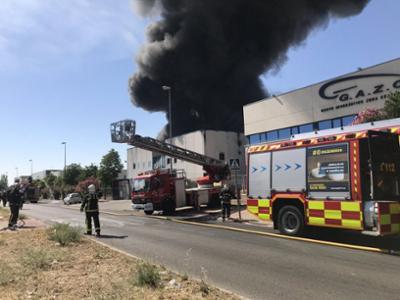

Tecnifuego cautions on the rise of fires in recycling facilities.

TECNIFUEGO, the Association of Spanish Fire Protection Companies, has released a report on industrial fires in the first quarter of 2023. The report highlights a surge in the number of such incidents in recycling plants. He also notes the rise in logistics warehouses due to the growth of e-commerce and highlights that the industry experiences over 120,000 fires annually.
The information gathered by TECNIFUEGO is from the UNESPA Report (Spanish Union of Insurance Companies) and the media. The 2022 Insurance Report by UNESPA features a section on industrial fires. The report reveals that insurers paid out a total of 379 million euros for 124,631 claims, with an average claim cost of 8,221 euros. The highest value claims amounted to 50,299 euros. The increasing amount of logistics warehouses across Spain is notable.
Another notable statistic is the rising incidence of fires in recycling facilities. According to information provided by the Guardia Civil's Central Operational Environmental Unit: "Every month, we encounter one to two fires that could be arson.” (El País, 5 June 2023) Such fires have risen since 2018, when China, the largest recipient of waste, stopped taking waste from other countries. Until then, it was the primary importer and recycled this waste material at that location.
An alarming trend in the recycling industry is the surge in fires occurring at recycling plants that process household appliances and devices equipped with lithium batteries - a highly severe fire hazard that is being extensively researched for effective extinguishment techniques and substances. The British Metals Recycling Association (BMRA) underlines that battery-related fires that arise from discarded electric bicycles and scooters are increasingly prevalent. “A rising issue jeopardising the security of both citizens and workers of the recycling industry.”
Minimising the Risk
TECNIFUEGO suggests engaging specialised companies that are duly accredited and approved by the relevant autonomous community's industry to assist industrial users with proper fire protection installations for their industry and maintenance needs. Following the UNE 23580 standards can aid in maintaining the installations by providing guidance for completing mandatory maintenance reports, which in turn promotes compliance with the Fire Protection Installations Regulation. Industries must adhere to the regulations regarding fire safety in industrial facilities. The regulation is undergoing revision and is expected to be published in the upcoming months.
Moreover, it is worth noting the progress made in fire safety technologies in recent years. For instance, the monitoring of fire protection installations system signals (detection, alarm, and extinguishing) has experienced significant growth due to the digitisation of data. This ensures uninterrupted monitoring of industrial fire protection installations, which includes providing maintenance services or checking alarms through fire alarm receiving centres.
Digitalisation offers numerous advantages, including improved reliability, faster and more efficient maintenance, reduced operating costs, enhanced service quality, and increased energy efficiency. Whilst remote maintenance provides valuable support, it cannot fully replace on-site maintenance, as stated by TECNIFUEGO.




